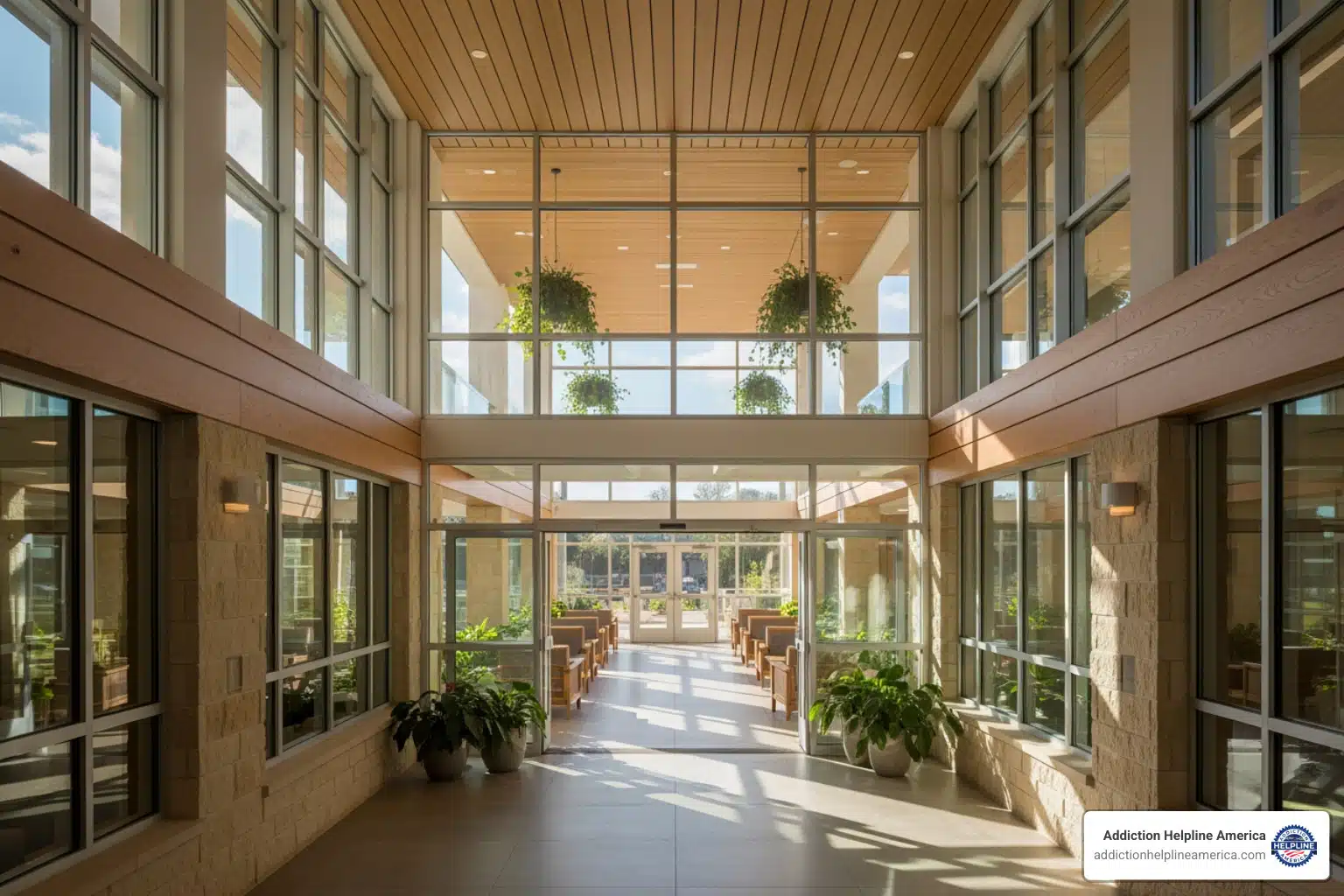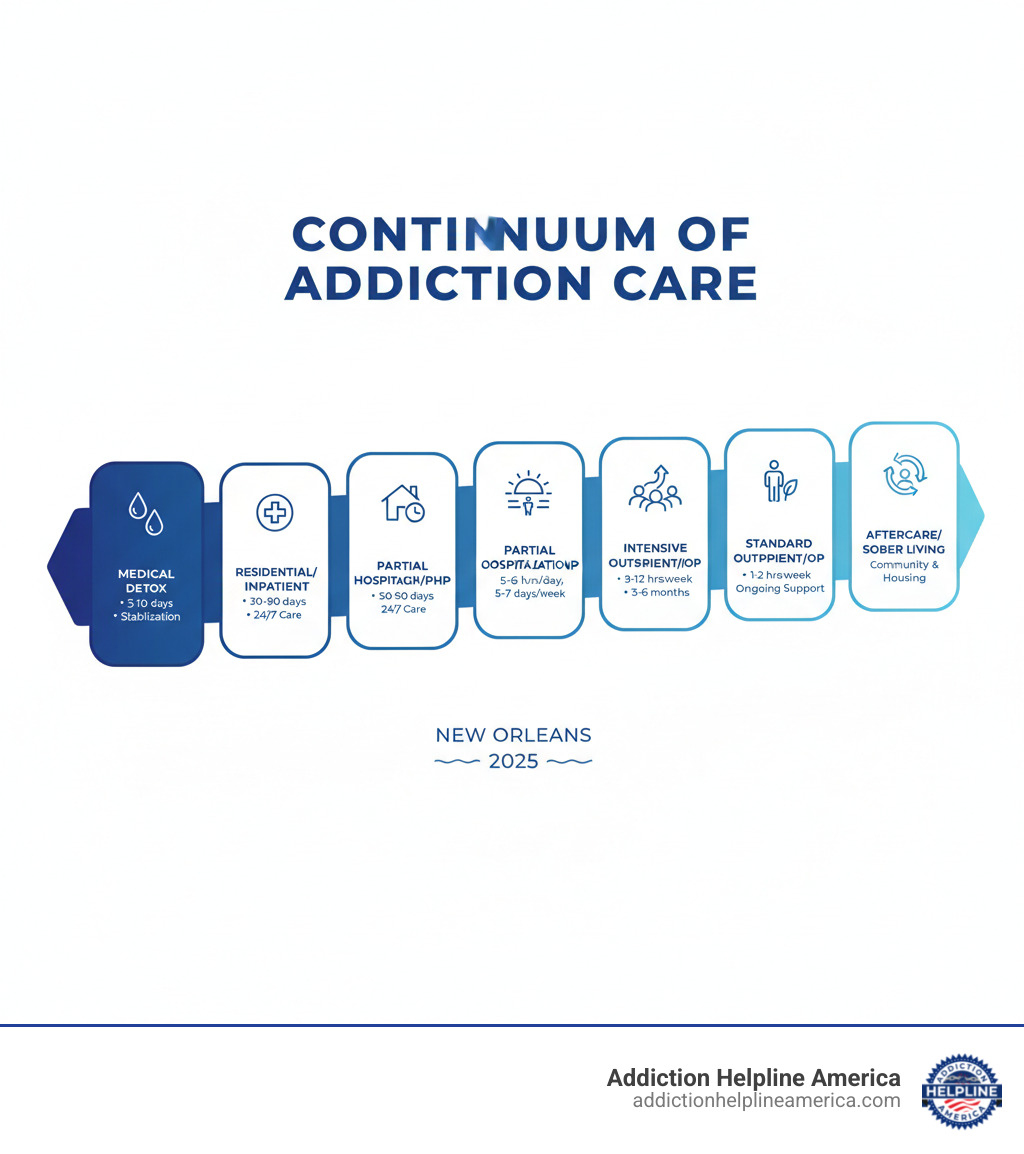
Finding Hope and Help: Your Guide to Drug Rehab Centers in New Orleans
Drug rehab centers in New Orleans offer a full spectrum of care, from medical detox to outpatient support. Here’s a quick overview:
- Care Options: Medical detox, inpatient/residential, Partial Hospitalization (PHP), Intensive Outpatient (IOP), and standard outpatient programs.
- Typical Costs: Outpatient care can range from $1,000-$10,000+, while inpatient programs may cost $5,000-$50,000+.
- Affordable Care: State-funded programs provide free or low-cost treatment for eligible residents, and most major insurance is accepted.
- Top-Rated Centers: We reviewed 15 New Orleans facilities, highlighting leaders like NOLA Detox, Odyssey House Louisiana, Imagine Recovery, and Bridge House/Grace House.
New Orleans’ vibrant culture exists alongside serious substance use challenges. Fortunately, the city is also home to compassionate, comprehensive treatment centers dedicated to helping people reclaim their lives.
Finding the right program can feel overwhelming. This guide cuts through the confusion with honest reviews of top drug rehab centers in New Orleans, helping you steer questions about cost, insurance, and levels of care. We’ll cover everything from evidence-based therapies to free programs, so you can find the right fit for your needs.
At Addiction Helpline America, we connect individuals and families with life-saving treatment resources. Our mission is to provide the confidential guidance you need to take the first step toward recovery.
Understanding the Treatment Landscape in New Orleans
The best drug rehab centers in New Orleans understand that recovery isn’t one-size-fits-all. They blend evidence-based treatments like Cognitive Behavioral Therapy (CBT) with holistic approaches to heal the whole person—addressing physical, emotional, and spiritual well-being.
Personalized care is the cornerstone of effective treatment. A center that takes time to understand your unique history, substance use patterns, and mental health needs can create a plan that truly fits your life.
Types of Drug and Alcohol Rehab Programs
Addiction treatment is offered across a spectrum of care. As you progress in recovery, you typically step down to less intensive levels.
- Medical Detox: The first step for physical dependence on substances like alcohol, opioids, or benzodiazepines. Medical professionals provide 24/7 monitoring and medication to manage withdrawal symptoms safely. This phase typically lasts 3 to 10 days.
- Inpatient/Residential Treatment: An immersive option where you live at the facility for 30 to 90 days. It provides a structured, trigger-free environment focused entirely on recovery through daily therapy and counseling.
- Partial Hospitalization Programs (PHP): Often called “day treatment,” PHP offers intensive therapy for 5-6 hours a day, 5-7 days a week, while you live at home or in a sober living facility. It’s an effective step-down from inpatient care.
- Intensive Outpatient Programs (IOP): A flexible option providing 9-12 hours of treatment per week, allowing you to maintain work or family commitments. IOP focuses on relapse prevention and building coping skills for real-world challenges.
- Standard Outpatient Programs (OP): The least intensive option, involving just a few hours of therapy each week. It’s ideal for ongoing support after completing a higher level of care or for those with milder substance use issues.
- Sober Living Homes: Structured, substance-free residences that provide a supportive community for individuals transitioning back to daily life. They offer accountability and a safe environment to practice recovery skills.
Common Conditions Treated
Drug rehab centers in New Orleans are equipped to treat a wide range of substance use and co-occurring mental health disorders.
- Substance Use Disorders (SUD): Treatment is available for addiction to illicit drugs, prescription medications, and alcohol.
- Alcohol Use Disorder (AUD): Many facilities offer specialized programs for alcohol addiction, including medically supervised detox to manage potentially dangerous withdrawal.
- Opioid Addiction: Centers provide specific pathways for opioid use disorder, often incorporating Medication-Assisted Treatment (MAT) to manage cravings and withdrawal.
Approximately 50% of people with substance use disorders have a dual diagnosis, meaning they also have a co-occurring mental health condition. Quality rehabs treat both simultaneously.
- Anxiety and Depression: Treatment helps individuals address the root causes of these conditions and learn healthier coping mechanisms than self-medication.
- Trauma: Many centers offer trauma-informed care, creating a safe environment to process painful past experiences that often fuel substance use.
A Closer Look at Top Drug Rehab Centers in New Orleans
Our research team at Addiction Helpline America evaluated 15 drug rehab centers in New Orleans, focusing on accreditation, services, and patient care to identify the best options. Accreditation by bodies like the Joint Commission (JCAHO) or CARF signals a commitment to high standards of safety and quality. Here are some of the facilities that stood out.
NOLA Detox and Recovery Center
Voted #1 Addiction Treatment by BEST OF NEW ORLEANS, NOLA Detox offers a complete continuum of care under one roof. They provide Medical Detox, Inpatient Residential, Extended Care, PHP, and IOP programs, plus Recovery Residences. Known for their compassionate, evidence-based approach, they offer same-day admissions and free transportation from surrounding areas, removing common barriers to entry. Their mission is driven by founders with personal recovery experience, focusing on whole-person wellness. You can view their New Orleans Residential Location.
Odyssey House Louisiana (OHL)
A non-profit cornerstone in the community for over 50 years, OHL provides a full range of services with a focus on accessibility. They offer Medically Supported Detox, Inpatient and Outpatient SUD Treatment, and Housing Programs. OHL is distinguished by its low-barrier services, including a Sobering Center as an alternative to jail for public intoxication and a Low Barrier Shelter for those experiencing homelessness. By integrating primary care and community outreach, OHL addresses the interconnected nature of physical health, mental health, and addiction. You can hear a success story from OHL to see their impact.
Imagine Recovery
Established in 2017, Imagine Recovery provides an intimate, stigma-free setting with a modern approach. They offer PHP, Day & Evening IOP, and Outpatient Programs, along with sober living at Imagine House. What sets them apart is their focus on treating mental health as a primary concern. As a JCAHO Accredited facility with a highly qualified clinical team, they provide individualized attention and robust family support. Their holistic methods incorporate mindfulness, art, and nature into the healing process.
Bridge House / Grace House
Bridge House and Grace House are vital non-profit organizations offering long-term, no-cost residential addiction treatment. These gender-specific programs (Bridge House for men, Grace House for women) provide a structured path to recovery for those facing financial barriers. The length of stay is flexible, allowing individuals the time they need to build a strong foundation. Grounded in 12-Step programming, the centers also provide vocational training and life skills development to prepare residents for independent, sober living.
Navigating the Cost of Rehab in New Orleans
Concerns about the cost of treatment are valid, but they shouldn’t prevent you from seeking help. Numerous options exist to make recovery affordable. The cost of drug rehab centers in New Orleans varies based on program type, duration, and amenities.
Here are some typical cost ranges before insurance or financial aid:
| Program Type | Average Cost in New Orleans |
|---|---|
| Outpatient Rehab | $1,000 – $10,000+ |
| Inpatient Rehab | $5,000 – $50,000 |
While New Orleans’ average treatment cost of $59,468 is in line with state and national averages, most people do not pay this full amount out-of-pocket.
The Role of Insurance in Paying for Treatment
The Affordable Care Act (ACA) mandates that most health insurance plans cover substance use disorder treatment. The admissions team at most rehab centers will verify your benefits for free, explaining your coverage, co-pays, and out-of-pocket maximums.
Using an in-network provider is typically more affordable than an out-of-network one. In New Orleans, Blue Cross Blue Shield, Aetna, and Cigna are widely accepted, along with Medicaid, Medicare, and many other providers.
Finding Low-Cost and Free Drug Rehab Centers in New Orleans
If you lack insurance or have limited financial resources, several options are available.
- State-funded programs: These tax-funded facilities offer free treatment to individuals with no income and use a sliding scale for those with some income. Priority is often given to pregnant women and other vulnerable populations. You’ll typically need to provide proof of residency and income status.
- Payment Assistance: Many private facilities offer financial aid, including scholarships, grants, and flexible payment plans. Sliding-scale fees adjust the cost based on your income. Don’t hesitate to ask admissions staff about available financial assistance.
At Addiction Helpline America, we can help you steer these financial options to find a program that fits your clinical needs and your budget.
How to Choose the Right Rehab and Get Admitted
Choosing the right drug rehab center in New Orleans is a critical step. It’s about finding a program that feels safe, supportive, and aligned with your personal needs. Addiction Helpline America offers free, confidential guidance to help you make an informed decision.
Key Factors for Choosing One of the Drug Rehab Centers in New Orleans
Consider these factors when evaluating facilities:
- Accreditation: Look for accreditation from the Joint Commission (JCAHO) or CARF. This signifies the facility meets high standards for quality care and patient safety.
- Staff Credentials: Inquire about the qualifications of the clinical team. Licensed therapists, addiction specialists, and medical doctors ensure you receive expert care.
- Treatment Modalities: A quality center offers evidence-based therapies like CBT, DBT, and Motivational Interviewing. For opioid or alcohol addiction, ask about Medication-Assisted Treatment (MAT).
- Location and Environment: Decide if you prefer to be close to home or in a new environment. The atmosphere of the facility—whether it’s a serene retreat or a structured clinical setting—should feel right for you.
- Aftercare Planning: Great rehabs emphasize aftercare. This includes connections to sober living, outpatient services, and alumni programs to support long-term recovery.
The Assessment and Admissions Process
The admissions process is designed to ensure you get the right care.
- Initial Phone Call: A confidential call with the admissions team allows you to ask questions and share your situation.
- Pre-screening and Insurance Verification: The team conducts a brief assessment and verifies your insurance benefits, providing clarity on costs.
- Clinical Assessment: A comprehensive medical and psychological evaluation is performed to understand your physical health, withdrawal risks, and any co-occurring mental health disorders.
- Personalized Treatment Plan: Based on the assessment, clinicians create a custom roadmap for your recovery, outlining specific therapies and support services.
- Admission Day: You’ll complete paperwork and settle in. If you are at risk for withdrawal, it’s crucial to seek help at an inpatient medical detox center for your safety and comfort.
Frequently Asked Questions about New Orleans Rehabs
It’s natural to have questions when considering treatment. Here are answers to some common concerns about drug rehab centers in New Orleans.
Will I lose my job if I go to rehab?
No, in most cases, your job is protected. The Americans with Disabilities Act (ADA) classifies substance use disorder as a disability, preventing employers from firing you for seeking treatment. Additionally, the Family and Medical Leave Act (FMLA) allows eligible employees to take up to 12 weeks of unpaid, job-protected leave for medical reasons, including addiction treatment. You can request medical leave from your employer, often without disclosing the specific reason.
How long does addiction treatment take?
Treatment duration is highly individual and depends on the severity of the addiction, the substance used, and the presence of co-occurring disorders. General timeframes are:
- Medical Detox: 3-10 days
- Inpatient/Residential: 30-90 days
- Outpatient (IOP/PHP): 3-6 months or more
Research shows that longer treatment durations often lead to better long-term outcomes. Recovery is a lifelong journey, and formal treatment is the first step.
What is Medication-Assisted Treatment (MAT)?
MAT is an evidence-based approach that combines FDA-approved medications with counseling and therapy. It is highly effective for opioid and alcohol use disorders. These medications work by normalizing brain chemistry, reducing cravings, and relieving withdrawal symptoms. This allows you to focus on therapy and address the root causes of addiction. MAT is not “replacing one drug with another”; it is a medical treatment for a chronic disease that improves survival rates and supports long-term recovery.
Find Your Path to Recovery Today
Seeking information about drug rehab centers in New Orleans is a courageous first step toward change. As this guide has shown, New Orleans offers a compassionate and diverse network of treatment options, from medical detox and inpatient programs to flexible outpatient care. Free and low-cost options are available, ensuring financial barriers don’t stand in the way of help.
Recovery is possible. The individuals who have found healing at centers like NOLA Detox, Odyssey House Louisiana, Imagine Recovery, and Bridge House/Grace House all started with a single step.
At Addiction Helpline America, we know that navigating these choices can be overwhelming. That’s why we offer free, confidential guidance to help you find a program that fits your unique needs. You don’t have to do this alone. We connect people nationwide with quality addiction and mental health treatment centers.
Let us help you find a personalized treatment plan in New Orleans. The path to a healthier life is waiting.
Find personalized addiction treatment in New Orleans, Louisiana
Our helpline is 100%
free & confidential
If you or someone you care about is struggling with drug or alcohol addiction, we can help you explore your recovery options. Don’t face this challenge alone—seek support from us.
Programs
Resources
Will my insurance
cover addiction
treatment?
We're ready to help
Find the best
drug or alcohol treatment
center
Are you or a loved one struggling with addiction? Call today to speak to a treatment expert.
















